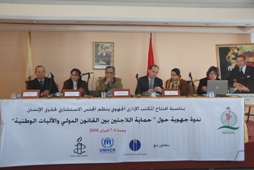Regional Seminar on the Protection of Refugees
In cooperation with the Moroccan Organization for Human Rights (OMDH), the United Nations High Commissioner for Refugees (UNHCR) in Morocco, the United Nations office in Morocco and Amnesty International (Morocco section), The Advisory Council on Human Rights (CCDH) held a regional seminar on the protection of refugees between international mechanisms and national ones, on February 6-7, 2008, in Oujda, east of Morocco.The seminar, organized on the occasion of the inauguration of the CCDH regional section in Oujda and within the framework of the traveling exhibition on postage stamps and human rights, aimed to continue debate between public authorities, civil society activists, researchers and international organizations on the issues and the difficulties raised by the protection of refugees in Morocco as both a transit and host country.

The opening session of the seminar was attended by the Wali of the Eastern Region of Morocco, Governor of the Prefecture of Oujda-Angad, Mr. Mohamed Ibrahimi, representatives of NGOs in the eastern region, representatives of public authorities, magistrates, CCDH representatives, international organizations concerned, human rights organizations and academics.
The seminar revolved around the following themes: “refugee protection in international law”, “role of public authorities in the protection of refugees and asylum seekers”, “national mechanisms for the protection of refugees”, “role of the judiciary in the protection of refugees”, “role of NHRIs in the protection of refugees” and “role of NGOs in the protection of refugee”.
On this occasion, the CCDH President, Mr. Ahmed Herzenni, said that Morocco, which had made significant steps in the field of human rights, was required to work for the preservation of the gains in this field and enhancement of the social and economic rights, including those of refugees.
Mr. Herzenni stressed that Morocco was among the first countries to ratify the Geneva Convention of July 1951 on asylum and the protocol of the Convention in 1974.
He noted that the Kingdom faced many problems and challenges related to the protection of refugees, highlighting that Morocco was aware of the issue of immigrants and refugees, given that many of its citizens live in other host countries.
The president of the OMDH, Ms. Amina Bouayache, stressed the importance of the issue of the protection of refugees and asylum seekers, given the new changes in Morocco, which moved from a country of emigration to a transit and host country. She said that Morocco had received a growing number of nationals from sub-Saharan countries of Africa.
The OMDH, she added, signed in September 2007 a partnership agreement with the UNHCR to create a center in Rabat and Oujda for providing legal assistance to refugees and asylum seekers.
On the other hand, Mr. Johannes Van Der Klaauw, the UNHCR representative, pointed out that the phenomenon of refugee seeking poses significant challenges to public authorities who must fulfill their commitments and obligations, as well as civil society activists who defended these people.
According to UNHCR statistics, he noted, the number of sub-Saharan refugees settled in Morocco until the end of 2008 is about 800 refugees against 8,300 in the five Maghreb countries, and 350 asylum seekers against 6,000 in the other Maghreb countries.
Mr. Mohamed Sektaoui, Director General of Morocco’s section of Amnesty International, deemed that the issue of refugees in Morocco and in all other countries of North Africa remained closely linked to the phenomenon of illegal immigration, stressing that many of these refugees went to the UNHCR representative body in Morocco requesting the return to their countries of origin. He argued that the role of civil society and nongovernmental organizations (NGOs) remained very limited as regards the rights of refugees and asylum seekers.






















